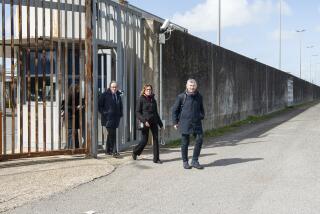Suspected WWII Criminal at Large in Argentina
- Share via
BUENOS AIRES — While Argentine and Croatian authorities pledged Tuesday to arrest and extradite to Croatia the commander of a World War II concentration camp living in Argentina, a high-ranking Argentine official expressed frustration that the suspected war criminal remained at large more than a week after his presence became public.
As Croatian officials declared they would file formal extradition papers shortly and two Argentine judges continued investigating, the whereabouts and legal status of Dinko Sakic were uncertain.
The 76-year-old Sakic admits to having commanded a concentration camp in Jasenovac, the “Auschwitz of the Balkans,” a complex where tens of thousands of prisoners were killed in death- and labor-camps between 1941 and 1945. But he claimed in a television interview aired last week that no one was killed in the camp during his two years as commander.
“I am very concerned. It would be a disaster if he escapes,” Victor Ramos, head of the Interior Ministry’s Institute Against Discrimination, Xenophobia and Racism, said in an interview. “I believe the justice system is moving too slowly. I asked the courts to have him arrested immediately. We are not talking about a highway robber. We are talking about the chief of a concentration camp, a real butcher.”
Acting under orders from President Carlos Menem, Ramos said he filed charges requesting Sakic’s arrest April 6, the day after Argentine television broadcast the interview in which Sakic proclaimed his innocence.
Ramos said it was the first time Sakic’s presence in the country had come to the attention of his institute, which was formed six months ago to fight hate crimes and hunt war criminals. The case has forced Argentina and Croatia to confront again the specter of a pro-Nazi, anti-Semitic past that remains uncomfortably tangible in the present.
Sakic’s capture has apparently been slowed by the Easter holiday and confusion about whether the federal or provincial court system has jurisdiction. Lacking an arrest warrant, Argentina’s intelligence service is watching Sakic to prevent him from fleeing, Ramos said.
Sakic, the retired former owner of a textile factory, has left his home in the beach resort of Santa Teresita and apparently traveled to Buenos Aires, but technically he is not a fugitive, Ramos said. Still, “even if I had doubts about this man’s identity, it is better to act quickly in a case like this,” he said. “The whole world is watching.”
Croatia shares blame, another Argentine official said, because it has yet to file a formal extradition request. That request is imminent, said a spokeswoman at the Croatian Embassy.
Jewish groups and the U.S. State Department, which this week urged speedy action, say that Sakic was responsible for the deaths of thousands of prisoners--mostly Serbs but Jews and Gypsies too. The toll in Jasenovac is estimated to have been as high as 600,000, said Tommy Baer, international director of the Jewish organization B’nai B’rith.
There are doubts about Croatia’s capacity to judge war criminals because of its pro-Nazi past and modern-day human rights abuses of minorities, particularly Serbs.
Some officials in the right-wing government of President Franjo Tudjman remain sympathetic to Croatia’s fascist Ustasha regime, the World War II Nazi puppet state. As Croatia seceded from the Communist Yugoslav Federation in 1991, it revived many Ustasha symbols, including elements of the regime’s flag and the name of its currency. Tudjman has made public statements that appeared to minimize the guilt of Ustasha commanders. He invited world scorn when he suggested burying Ustasha soldiers alongside their Serbian and Jewish victims in a new memorial at Jasenovac.
Argentina, meanwhile, has a history of providing shelter to Nazi fugitives after the war and has endured anti-Jewish violence by security forces in its recent past. Rather than keeping a low profile after he came to Argentina 50 years ago, the reportedly outspoken Sakic has been active in the sizable Argentine Croatian community. He traveled to Europe to espouse Croatian nationalist causes and boasted about having clout with Argentine politicians, according to Argentine officials and Jewish activists. He eluded attention from Argentine authorities despite a long interview he gave here in 1995 to a Croatian magazine.
His brutality was recalled in a recent interview by a Jasenovac survivor. Simo Klaic, 71, said he once watched Ustasha guards under Sakic’s command rig the exhaust pipe of a bus to empty into a cabin full of Jewish prisoners, all of whom were killed. “He was young, and he liked to dress well,” Klaic told Croatia’s independent weekly, Feral Tribune. “He was formally the deputy, but he was in charge of everything. . . . He had no mercy.”
Croatia’s justice and foreign ministers say that Sakic will be brought to Croatia for trial, and they promise to satisfy international demands for fair, complete proceedings. State prosecutor Marijan Hranjski told reporters that Sakic will probably be charged with crimes against humanity.
Zagreb authorities have also moved to put down an initiative from Belgrade, capital of the Serb-dominated rump Yugoslavia. Yugoslavia’s federal prosecutor was quoted Tuesday as saying that he has filed charges against Sakic--presumably a precursor to requesting extradition.
Rotella reported from Buenos Aires and Wilkinson from Belgrade.
More to Read
Sign up for Essential California
The most important California stories and recommendations in your inbox every morning.
You may occasionally receive promotional content from the Los Angeles Times.














